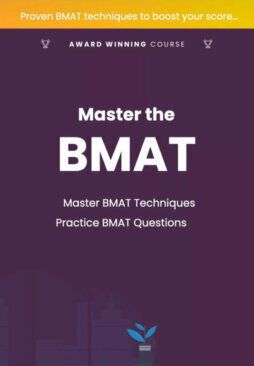UPDATE: Please note that CAAT have announced they will no longer be administering the BMAT in 2024, for 2025 entry. Cambridge University has announced that they will be using the UCAT as an admissions indicator. Oxford University are to announce admissions test changes in Spring 2024.
Applying for a medicine degree at Oxford or Cambridge is getting harder and harder. A complex application and increasing competition levels are only a few reasons a medical school offer at Oxbridge is difficult. At Oxbridge Mind, we offer comprehensive and easily accessible advice to support you in achieving your higher education dreams. We discuss the fundamental elements of a medical school application in this article. Beyond this article, we also intend to increase the accessibility of application information for students from various backgrounds. Have a look at our FREE Applying to Medicine course.
As mentioned, you need a comprehensive strategy when applying to medical school, especially for universities as competitive as Oxbridge. To support this process, we break down your application into three steps that you will need to attend medical school.
How To Get Into Oxbridge Medicine: Entrance Examinations
The University of Oxford and the University of Cambridge require The BioMedical Admissions Test (BMAT) for your medical school application. Specifically, the University of Cambridge requires applicants to the A100 Medicine course to take the BMAT. On the other hand, the University of Oxford requires applicants to the A100 Medicine, A101 Graduate Medicine Entry, and BC98 Biomedical Sciences courses to take the BMAT.
The BioMedical Admissions Test (BMAT) is one of the admissions examinations that some universities worldwide use to select applicants for medical, dental, biomedical, veterinary and health-related programmes. As these programmes are highly competitive and have more applicants than available seats, the BMAT allows candidates to stand out.
The BMAT tests your ability to apply scientific and mathematical knowledge, problem-solving, critical thinking and written communication skills essential to university-level study. It is distinct from the UCAT, a separate admissions examination for medicine and dentistry.
The purpose of the BioMedical Admissions Test is solely to provide an assessment of candidates’ potential to succeed in an academically demanding undergraduate biomedical degree course. It does not assess fitness to practice, which universities will examine in other ways. Admissions tutors use the test results as one component of the selection decision, along with additional information available. Test items draw upon general academic skills and basic science knowledge rather than recent specialist teaching.
More about BMAT
The BMAT is a 2-hour computer-based test that comprises three portions below:
- Section 1 evaluates analytical thinking, data interpretation, and inference.
- Section 2 assesses knowledge of fundamental mathematics and science
- Section 3 tests your communication abilities.
The University of Oxford uses your BMAT results to decide whether to offer you an interview invitation. They use this in conjunction with GCSE or equivalent-level academic qualifications. Although your chances of being shortlisted depend on several factors, Oxford does rely very heavily on the BMAT scores during shortlisting.
Unlike the University of Oxford, the University of Cambridge does not use BMAT scores to rank candidates. There is also no cut-off score for BMAT results, although the university’s website does state that a higher BMAT score would help increase your chances of an interview offer. Specifically, the website states that “Students who earn better BMAT marks are more likely to be called for an interview.” However, it is also crucial to note that Cambridge typically invites 90% of applicants to an interview.
To aid with test preparation, the Medic Mind “Applying to Medicine in 2023” course provides a variety of in-depth lessons and mock exams that you can download for free. We wholeheartedly believe that everyone who is devoted to the field of medicine in the UK should have access to it. This is why we have included insider tips and techniques recommended by our expert UCAT and BMAT tutors, who scored amongst the highest in the country in these exams.
How To Get Into Oxbridge Medicine: Personal Statements
You need to submit a 4000-character essay as part of your application to any course at any university in the UK. The same applies to Medicine at Oxbridge. But, don’t worry! With our personal statement writing tips, you will be well on your way to creating the ideal personal statement to help you get a place in medical school.
Include the following aspects of your portfolio in your essay:
- Work experience
- Volunteering experience
- Leadership positions
- Your dedication to medicine
- Any relevant extracurricular activities
However, be careful not to fall into the trap of simply listing and describing your achievements. Instead, reflect on your experiences and accomplishments as it is the most crucial part of your personal statement. This shows admissions tutors that you are able to reflect on your experiences and grow, which is an integral skill that you need to show when you are studying medicine. Our free and easily accessible guides explore the various ways in which to reflect in a concise but confident manner.
How To Get Into Oxbridge Medicine: Interviews
The final stage before being accepted into medical school is the interview. Multiple mini interviews (MMIs) or panel interviews are the two main interview styles used by UK medical schools. You must make sure that you research the type of interview that your chosen medical school uses.
Local medical schools commonly use MMIs, which require a great detail of preparation. These interviews test various skills, from ethical problem-solving to dexterity. On the other hand, admissions tutors in panel interviews tend to ask you more personal questions related to your personal statement and portfolio. This interview style, though, does not come without its challenges. Consequently, our Medicine Interview experts have compiled a series of free tutorials, sample questions and mock interviews to help you perfect your Medicine interview strategies. You can practise and refine your responses using these free resources to ensure that you stand out in your medical interview. Remember that this is the last chance you have on making a good impression.
If you would like more information regarding our courses, speak to one of our Medicine Application Experts.
We wish you well with your applications and look forward to seeing you soon in the NHS!



